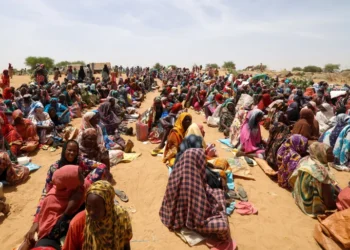The recent influx of mostly young, male migrants to Germany has led to an increase in violent crime, a study has found.
The study, by criminologist Christian Pfeiffer and funded by the German government, uses figures from the northern state of Lower Saxony to examine the impact of refugee arrivals on crime in 2015 and 2016.
The study published today attributes a 10.4 percent rise in violent crimes in the state during those two years almost exclusively to refugees.

But it also found that migrants are most likely to be the victims of crime committed by migrants. In 90 per cent of homicide cases where a migrant was the suspect, the victim was also a foreigner.
His team found that living conditions in detention centres, where dozens of young men of different ethnicities and religions are held together in cramped conditions, contributed to the problem.
During 2015 more than a million migrants arrived in Germany after Merkel threw open the borders with the pledge: ‘We can do it.’
Pfeiffer, the former Minister of Justice of Lower Saxony, also found huge variation in crime rates between those arriving from various countries.
Those from north Africa were the most likely to commit offences while Syrians, Afghans and Iraqis were among the least likely, Der Spiegel reports.
Pfeiffer believes this is because war refugees from the Middle East are quickly told they will be allowed to remain and are therefore more likely to play be the rules.
Meanwhile those who do not qualify for permanent residency, with north Africans chief among this group, see little reason to obey the law.
Using robbery as an example, Pfeiffer told ZDF that north Africans made up 31 per cent of migrant robbery suspects but just 0.9 per cent of total migrants.
Pfeiffer is calling on the EU to secure its borders to stop those who will not be allowed to settle, such as north Africans, on to the continent.
But he acknowledged that for those who have managed to make their way into Europe, the solution becomes much more complicated.
He said: ‘I do not think that then it is sufficient to say: expulsion, expulsion, expulsion. It is an enormously difficult procedure.
‘I think it is time now to use the new coalition talks for a new perspective in refugee policy, namely investing huge amounts of money for a return program.
‘We need development aid for these countries, where the unwanted refugees come from, so that we can offer them: Please take your compatriots back, then you will also get support from us, so that they can land with you.
‘We support your labor market, we do everything we can to make this return successful. But you have to take it.’
He also suggested providing language courses for migrants in Germany to help them integrate, and training for those forced to return to provide them with opportunities in their home country so they will not return.
Pfeiffer also noted the presence of women has a calming effect on male refugees, and said the idea of reuniting families to reduce violence was ‘not stupid’.









